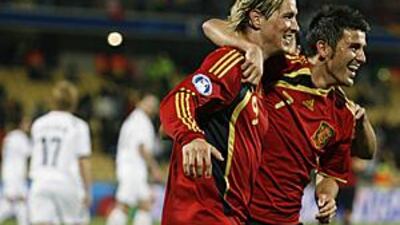JOHANNESBURG// It was, admittedly, only against New Zealand, but still, there was a class and an authority to Spain's 5-0 victory on Sunday. It was not just the margin of the win, or the sense of control that was so striking, though, it was the feeling of a team who are continuing to develop. At national level, the shelf-lives of the successful tend to be very short. By its very nature there is a haphazardness to international football: whereas clubs can plug gaps with signings, countries are stuck with what they've got, magnifying the impact of injuries or deficiencies in certain areas.
Only West Germany, in 1972 and 1974, and France in 1998 and 2000, have managed to win the European Championship and World Cup back to back, but it may be that this Spanish generation, already European champions, are yet to reach their peak. Their unbeaten run stretches to 33 games, just two short of the record set by Brazil between 1993 and 1996. Some teams might be daunted by the pressure of maintaining such a run but, having cast off their reputation as underachievers, Spain seem to be thriving on it. If anything, they are getting better.
"After so many years of struggling," said Fernando Torres, "this is the moment of our fulfilment." Although he scored the winner in the final, it should be remembered that Torres had been criticised at the Euros, with Spanish newspapers despairing of his lack of goals for the national team. His hat-trick in the first 18 minutes on Sunday was breath-taking, emphasising his claims to be the most complete striker in the world.
Each finish was clinical, but each was different - a curving clip from the edge of the box; a deft sidefoot, opening his foot to guide in a low cross; and a powerful and accurate header. His Liverpool teammate, Albert Riera, who played a part in three of the goals, adds a directness. He may not necessarily be a better player than Valencia's David Silva, with whom he seems to be competing for a midfield berth, but his delivery from the left does provide another alternative.
Spain's close-passing can be mesmerising, and their excellence in maintaining possession underpins everything they do, but they also have the option of slinging in crosses for Torres. The only potential problem might be in having two strikers of the class of Torres and David Villa, the top scorer at Euro 2008. The trend in modern football is to play a single striker, something eight of the 16 teams at Euro 2008 started with, with a further three moving away from 4-4-2 over the course of the tournament.
Indeed, it is arguable that Spain played their best football in the final hour of the semi- final against Russia and in the final against Germany, after Villa had been injured and they had switched to a 4-1-4-1. There is evolution even within the front two. Whereas Villa was very much the main marksman in Euro 2008, with Torres operating as an auxiliary striker, almost as a superior target-man. That relationship has now changed, with Torres the point striker and Villa operating off him.
That Villa is so comfortable dropping deep and pulling wide means he can function almost as a midfielder, but still, it may be that a side employing disciplined five-man midfield can upset Spain's rhythm. That said, England under Fabio Capello play variant of 4-2-3-1, and they found themselves comprehensively outpassed in February's friendly in Seville. If Spain are so good in possession that they can still dominate even when effectively a man down in midfield, that truly is a frightening prospect.
jwilson@thenational.ae

